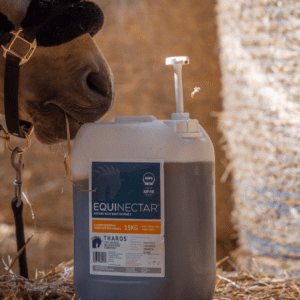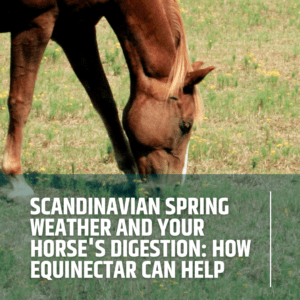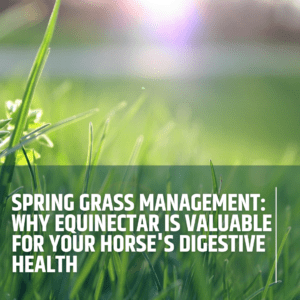
By Dr Rosemary Waring
Chief Science Officer / Tharos Co-Founder
Antibiotics and the Equine Microbiome
01
Introduction
We occasionally receive questions from potential customers that are something like this: "My horse has been on antibiotics and now has soft droppings and seems a bit bloated, do you think there is a connection?"
To try to answer this, I have looked at the scientific literature to gain an understanding of the research surrounding antibiotics and their impact on the equine microbiome.
02
What the science shows
In humans, antibiotic use can have a drastic effect on the microbiome as it reduces the levels of the ‘good‘ bacteria along with the ones that are pathogenic (Maier et al 2021). This disrupts the bacterial balance and reduces production of the short chain fatty acids (acetic, propionic and butyric acid) which are thought to be a measure of gut health (Tierney et al 2023). Prolonged use of antibiotics makes the individual more susceptible to gut problems such as constipation/diarrhoea (dysbiosis) (Martel et al 2022; Nel Van Zyl et al 2022) and also to chronic conditions such as IBS (irritable bowel syndrome) (Mamieva et al 2022). The changes in the microbiome include a loss of bacterial diversity and differences in the bacterial profile, for example using beta-lactam, glycopeptide and macrolide antibiotics leads to depletion of beneficial bacteria in the Bifidobacterium and Lactobacillus genera (Duan et al 2022). It may be a long time before the original gut flora are re-established; this process can vary between two or three weeks and several months while occasionally a more permanent change occurs (Huang et al 2022).
Horses seem to respond in a similar way. Antibiotics play a major role in treating many equine problems and are vitally important as therapeutic agents for bacterial infections as well as prevention of postoperative and secondary infections (Khusro et al 2021). However, as in humans, there is a downside to their use. Sulphonamides, trimethoprim/sulphonamide combinations, penicillins such as Penicillin G and Ampicillin, ceftiofur and enrofloxacin have all been shown to cause gastrointestinal side effects in horses where treated animals develop diarrhoea, colic or colitis. Several of the ‘mycin’ group of antibiotics, as well as tetracyclines, have the same effects (Khusro et al 2021). Both these classes of compounds are broad spectrum, acting against a range of infections, so are likely to be widely used. Antibiotics like these, which obviously affect the function of the gut, also cause changes in the gut microbiome. This dysbiosis is often accompanied by an increase in permeability of the intestinal wall, so that using, for instance, trimethoprim sulfadiazine increases the blood levels of LPS (lipopolysaccharide) which is a biomarker for a leaky gut (Collinet et al 2022). Similarly, phenylbutazone, which can be used for inflammatory disorders in horses, also causes an increase in gut permeability and alters the microbiome, with a loss of bacteria in the Lachnospiraceae family (Whitfield-Cargile et al 2021). As in humans, changes can be long-lasting.
These findings have led to the development of treatments to restore the microbiome. The use of pre/probiotics, phage therapy or antimicrobial peptide polymers has been suggested (Gibson and Owen 2023) and faecal microbiota transplantation (FMT) has been tried. However, the protocols for FMT in horses are not yet sufficiently reliable for this method to be used therapeutically so it remains a theoretical possibility (Di Pietro et al 2023; Kinoshita et al 2022). Supplements which modulate the microbiome could be helpful in restoring the initial balance and treating antibiotic-induced equine dysbiosis. In agreement with this theory, formulations of ERME (Equinectar), which modulate the gut microbiome, were successful in a small pilot study although much more work needs to be done before there are clear answers to the problem.
References
1. Collinet A et al J Animal Sci 100(10), 2022 Oct 01
2. Di Pietro R et al Can J Vet Res 87(2): 85-96 2023 Apr
3. Duan H et al Crit Rev Food Sc i Nutr 62(6): 1427-1452 2022
4. Gibson GA and Owen EJ Surgical Infections 24(3):284-291 2023 Apr
5. Huang C et al Microbiology Spectrum 10(2): e0190421 2022 04 27
6. Khusro A et al J Equ Vet Sci 97 (2021): 103339
7. Kinoshita Y et al J Equ Vet Sci 114:104004 2022 07
8. Maier L et al Nature 599(7883): 120-124 2021 11
9. Mamieva Z et al World J Gastroenterol28(12):1204-19 2022 Mar 28
10. Martel J et al Trends Endocrinol Metab 33(4): 247-265 2022 04
11. Nel Van Zyl K et al Int J Antimicrob Agents 59(2): 106502 2022 Feb
12. Tierney BT et al App Env Microbiol 89(3): e0188022 2023 03 29
13. Whitfield-Cargile CM et al J Vet Int Med 35(2): 1121-1130 2021 Mar
ABOUT EQUINECTAR
Description
EquiNectar® is a natural feed supplement, that is scientifically proven to:
- Re-balance your horse’s gut bacteria
- Help your horse maximise benefits from its feed
- Improve your horse’s condition
More information
EquiNectar® is produced by Tharos Ltd in the UK. It is a natural source of digestive enzymes and contains only the following ingredients:
- Our patented enzyme rich malt extract
- Medium chain triglycerides (from coconut oil)
- Potassium sorbate
For more details of the enzymes within EquiNectar® take a look at the ingredients and enzymes page.
How to feed
Simply add EquiNectar® to your horse's daily feed, using the Feeding Rate chart to determine the correct amount.
For detailed instructions about how to introduce EquiNectar, please read the comprehensive Feeding Guide page.





